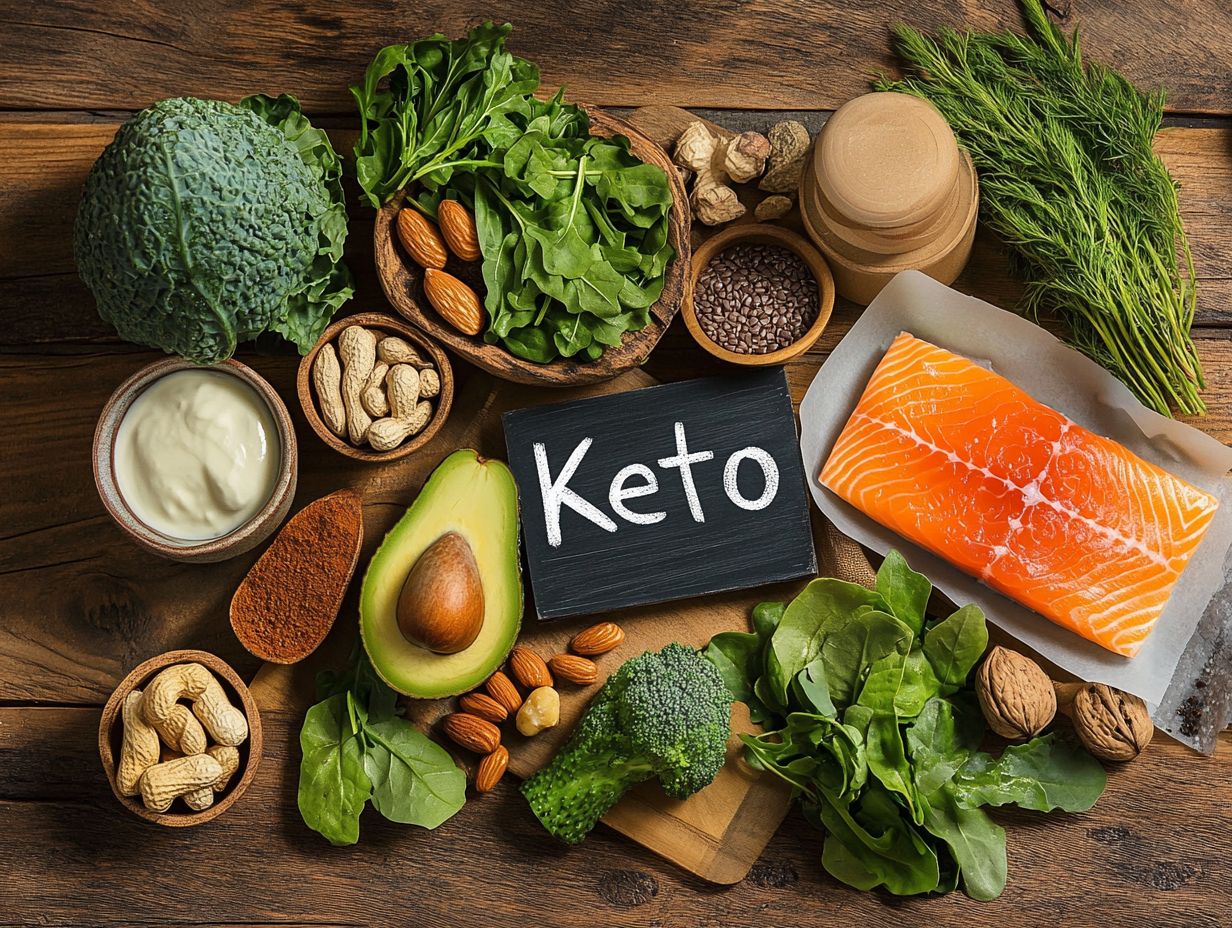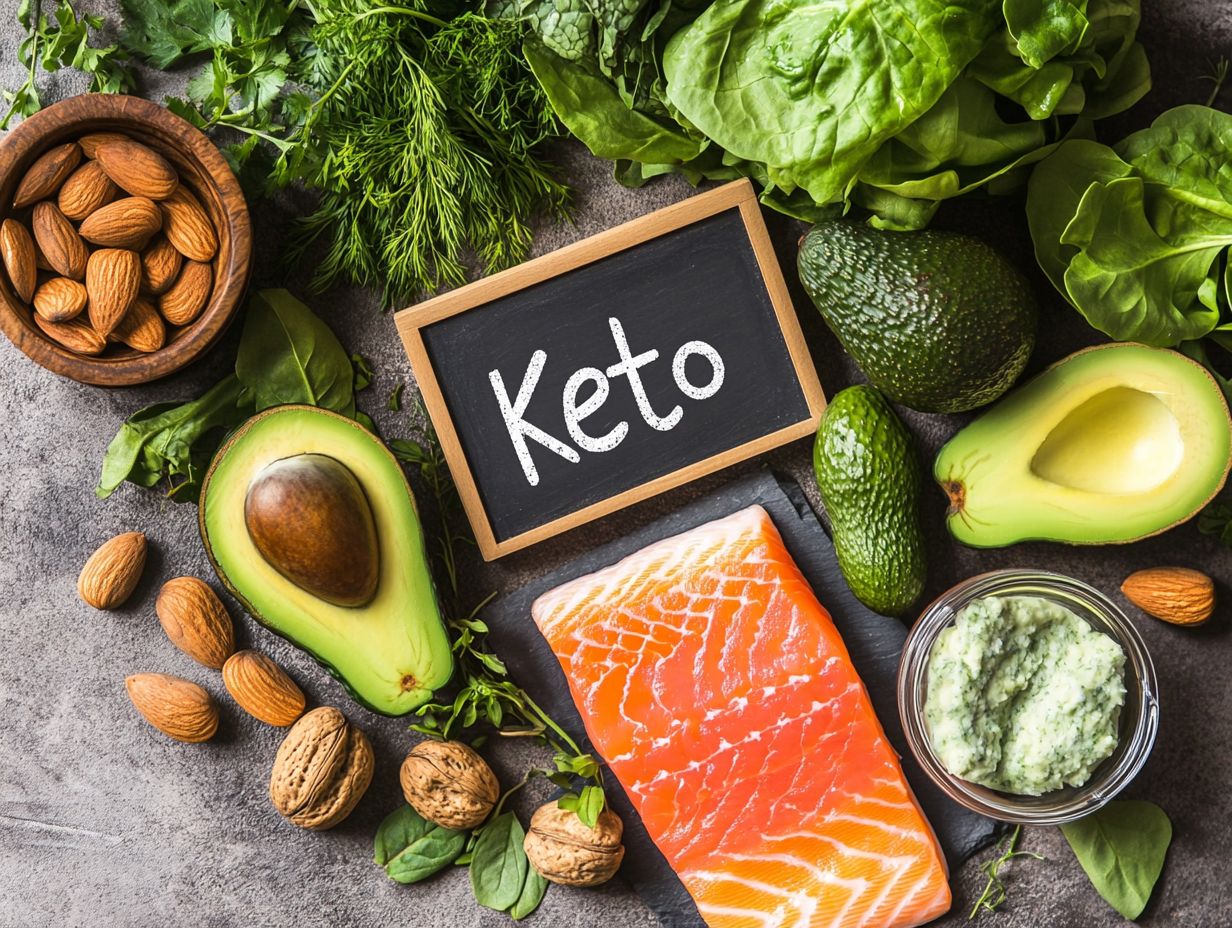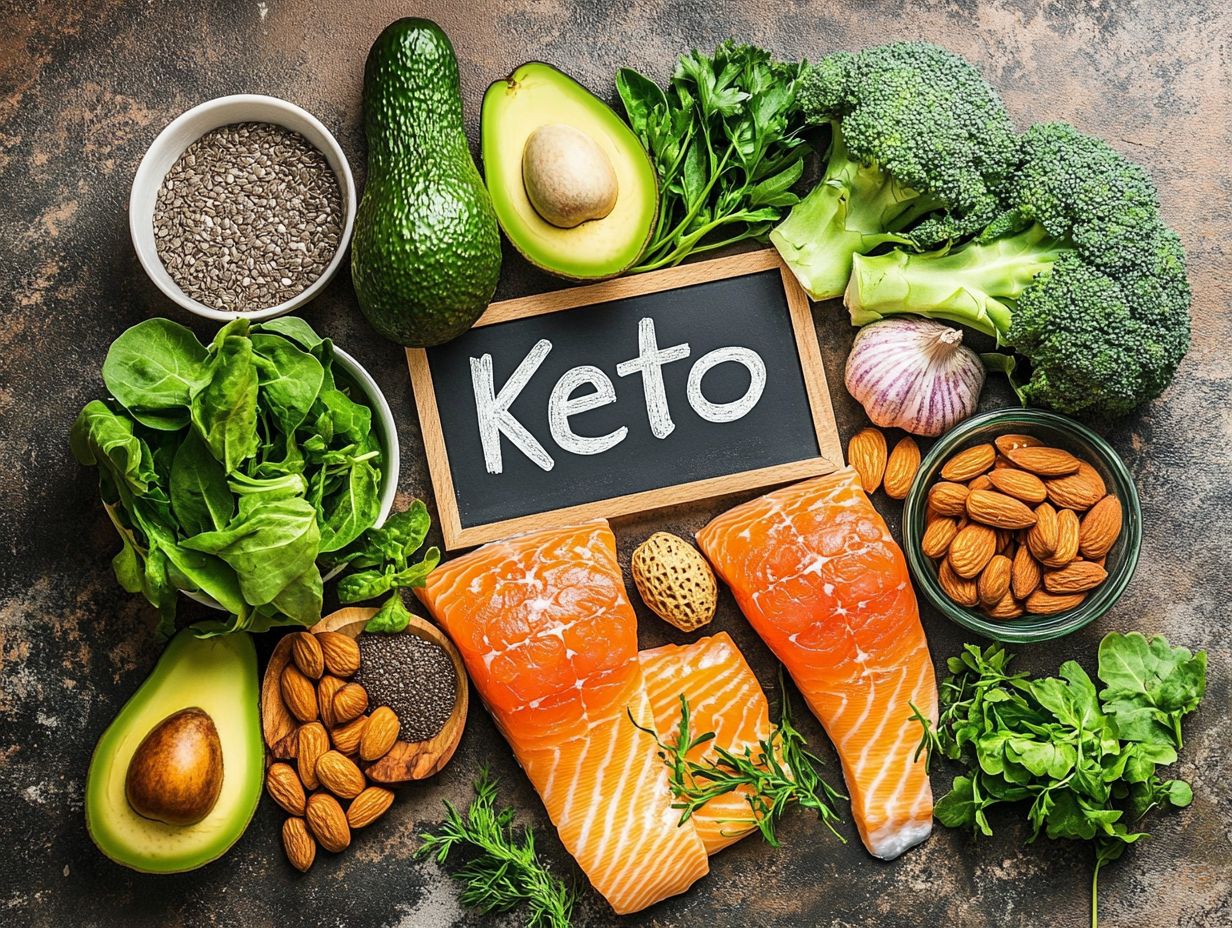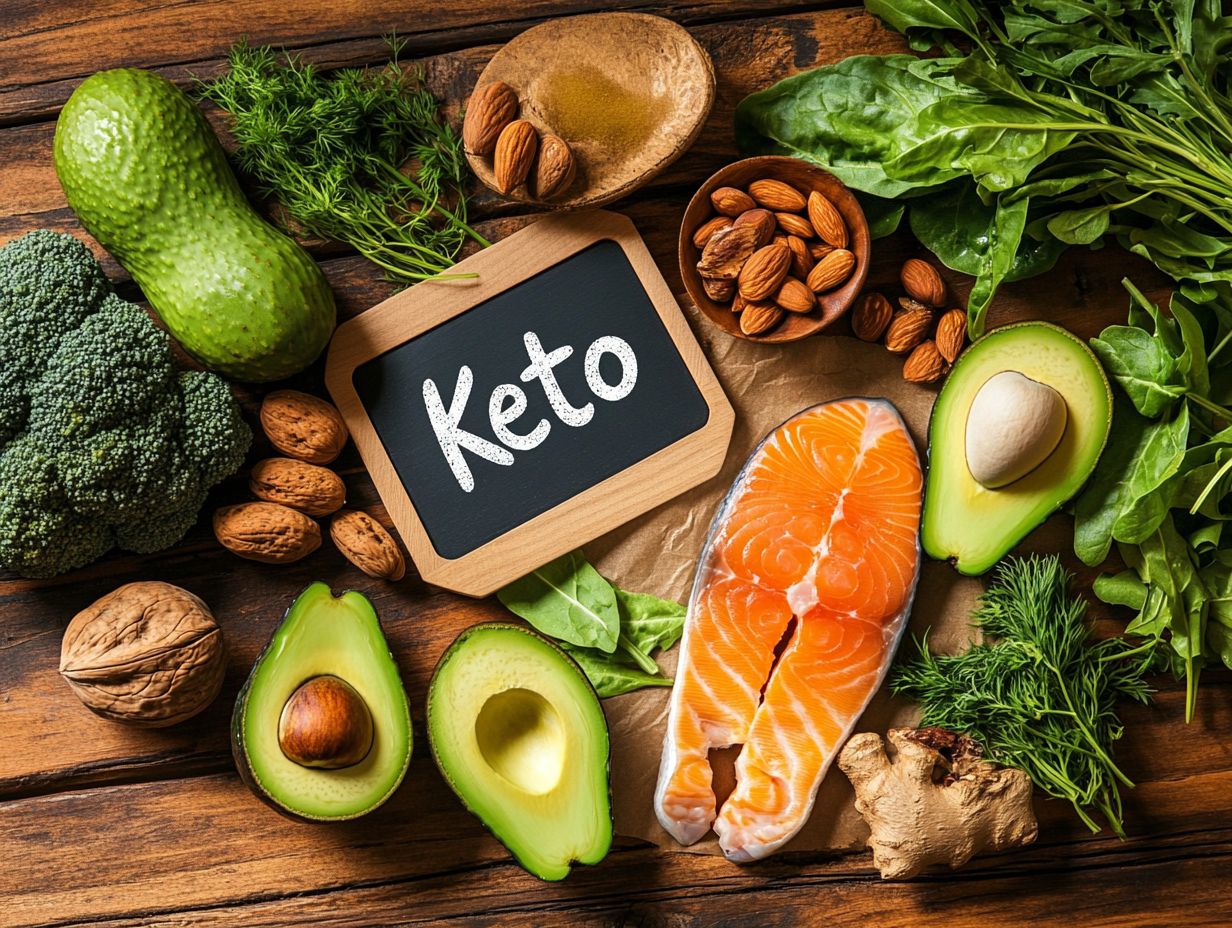Keto Nutrition: Understanding the Basics
The Keto Diet has undoubtedly piqued your interest, drawing in health enthusiasts and those keen on weight management with its promise of substantial benefits through a low-carb, high-fat nutritional approach.
In this article, you’ll delve into the fundamental principles of the Keto Diet, unpack the science behind ketosis, and uncover its myriad benefits, ranging from effective weight loss to boosted energy levels.
You’ll learn which foods to welcome into your meals and which ones to steer clear of, alongside practical tips to help you navigate this trending diet.
Get ready to kickstart a thrilling transformation in your eating habits and lifestyle!
Contents
Key Takeaways:

- The keto diet is a low-carb, high-fat plan that helps your body burn fat for energy.
- Cutting carbs means your body taps into stored fat, leading to weight loss and more energy.
- Beyond shedding pounds, the keto diet can help regulate blood sugar and cut down inflammation.
What is the Keto Diet?
The Keto Diet, often referred to as the ketogenic diet, is a carefully crafted eating plan that emphasizes high-fat and low-carbohydrate intake. Its primary aim is to shift your body s metabolism from relying on glucose for energy to utilizing stored body fat, thus entering a state where your body burns fat known as ketosis.
By significantly reducing carbohydrate consumption while encouraging healthy fats and moderate protein intake, this dietary approach has gained popularity among those pursuing effective weight loss and various health benefits, such as better insulin use and improved brain function.
Explanation and Key Principles
The ketogenic diet is defined by a significant reduction in carbohydrate intake, prompting your body to enter ketosis, where it burns fat for fuel instead of glucose.
In this dietary approach, you’ll typically find that fats make up about 70-75% of your daily caloric intake, while proteins account for around 20-25%, and carbohydrates are restricted to merely 5-10%. By emphasizing high-fat foods, the ketogenic diet transforms your metabolism and encourages your body to rely on its fat stores.
However, such a dramatic shift in your eating habits can lead to potential nutrient deficiencies, especially in vitamins and minerals commonly found in fruits, vegetables, and whole grains.
Thus, it s crucial for you to maintain a balanced nutrient intake to uphold your health and avoid any adverse effects that may arise from this low-carb lifestyle.
How the Keto Diet Works
The ketogenic diet operates by significantly lowering your carbohydrate intake, prompting your body to enter a metabolic state known as ketosis. In this state, your body becomes exceptionally efficient at burning fat for energy instead of relying on glucose.
This shift not only serves as an alternative energy source but can also enhance your athletic performance and support your weight loss goals.
The Science Behind Ketosis
Ketosis unfolds when your carbohydrate intake dips to a sufficiently low level, prompting your liver to convert stored body fat into ketones. These ketones serve as an alternative energy source for both your brain and body, effectively lowering glucose levels and improving insulin efficiency over time.
As your body transitions from using glucose to ketones for energy, a remarkable biochemical transformation takes place. Your liver synthesizes ketones, primarily beta-hydroxybutyrate and acetoacetate, from fatty acids.
These ketones not only fuel your cellular processes but also play a crucial role in signaling pathways, influencing metabolism and even how your brain communicates. This metabolic shift decreases your reliance on insulin, thereby boosting your body s insulin effectiveness.
As a result, maintaining ketosis can lead to lower blood sugar levels, making it a compelling strategy for those looking to manage their weight or enhance their metabolic health.
Ready to give the Keto Diet a try? Start your journey today!
Benefits of a Keto Diet

The benefits of the keto diet reach far beyond mere weight loss. You’ll discover a connection to improved cognitive function and enhanced energy levels.
This diet offers many health benefits, including better insulin sensitivity and possible therapeutic effects for conditions like epilepsy and certain neurodegenerative diseases. Living the keto way may very well elevate your overall well-being.
Weight Loss, Improved Energy, and More
Many individuals like you are turning to the ketogenic diet for its impressive weight loss results. This method actively burns stored body fat and fuels your day, leading to improved cognitive function.
By shifting your body s metabolism from carbohydrates to fats, the ketogenic diet initiates a process known as ketosis. Ketosis is when your body burns fat for energy instead of carbs. Here, fat gets broken down into ketones an efficient fuel source that enhances both your physical stamina and mental clarity.
Unlike many traditional diets that can leave you feeling drained due to fluctuations in blood sugar levels, a ketogenic lifestyle promotes stable energy throughout the day. As a result, you’ll enjoy sharper focus and enhanced brain performance.
This dual impact on weight loss and energy doesn t just support your physical endeavors; it also optimizes your cognitive capacity, making the ketogenic diet a compelling choice for anyone looking to improve their overall health.
Foods to Eat on a Keto Diet
A well-structured keto diet involves incorporating a diverse array of approved foods that are rich in dietary fat, moderate in protein, and low in carbohydrates. This includes non-starchy vegetables, healthy fats, and specific food groups that align with your goal of entering and sustaining ketosis.
By carefully selecting these elements, you can optimize your journey toward a successful ketogenic lifestyle.
Approved and Recommended Foods
Approved foods for the ketogenic diet include healthy fats like avocados and olive oil, proteins such as fish and eggs, and a selection of non-starchy vegetables to ensure you get enough fiber. These elements work in harmony to help you maintain a state of ketosis while providing essential nutrients.
When considering your dietary fat options, think about incorporating coconut oil, grass-fed butter, and nuts, as they play a crucial role in achieving your desired fat percentage. For protein, lean meats, poultry, and shellfish are not just scrumptious; they also aid in building and repairing muscle without packing in too many carbohydrates.
Incorporating fibrous non-starchy vegetables like spinach, kale, and broccoli will support your digestive health while keeping your carb counts low, making them perfect for anyone embracing this low-carb lifestyle.
Foods to Avoid on a Keto Diet
To successfully embrace a ketogenic diet, avoiding high-carb foods is crucial if you want to stay in ketosis! This includes grains, sugars, and starchy vegetables, as indulging in these can disrupt your body s ability to maintain ketosis.
Such choices may not only hinder your progress but also contribute to weight cycling and associated health risks. Prioritizing the right foods will set you on a path to achieving your goals with confidence and clarity.
Restricted and Prohibited Foods

On a ketogenic diet, you’ll want to steer clear of foods high in carbohydrates, like bread, pasta, rice, and sugary snacks. These can elevate glucose levels and disrupt your state of ketosis.
The consequences of indulging in these foods can extend beyond just a temporary dip in energy. Regular consumption may stall your progress toward achieving optimal ketosis and negatively affect your insulin sensitivity and overall metabolic health.
When you consume carbohydrate-heavy foods, your body prioritizes sugar burning over fat burning. This makes it increasingly difficult to maintain ketosis, the metabolic state many health enthusiasts aim for.
Sticking to your dietary restrictions is key to unlocking your energy potential! It minimizes health risks associated with blood sugar fluctuations, which can lead to increased cravings, mood swings, and long-term risks like diabetes.
Tips for Starting and Maintaining a Keto Diet
Starting a ketogenic diet requires careful food choices, strategic meal preparation, and possibly the guidance of a registered dietitian or healthcare provider. This helps ensure you maintain nutritional balance while adhering to the diet’s core principles.
Practical Advice for Success
To succeed on a ketogenic diet, focus on effective meal preparation. Planning your meals ahead of time is essential; it helps you manage your carb intake while ensuring a balanced diet.
Incorporating techniques like batch cooking, meal prepping, and using convenient storage solutions can save time and reduce the temptation to reach for unhealthy options.
It s important to recognize how your body responds to these dietary adjustments. Adapting to a low-carb lifestyle may present initial challenges, but with the right knowledge and support, you can navigate these hurdles with ease.
Professionals can provide tailored strategies and modifications that align with your individual needs, promoting sustainable adherence to the keto lifestyle.
Frequently Asked Questions
What is Keto Nutrition?
Keto Nutrition is a low-carb, high-fat diet that aims to put the body in a metabolic state called ketosis. In ketosis, your body burns fat for energy instead of carbohydrates.
What are the basic principles of Keto Nutrition?

The basic principles of Keto Nutrition include consuming a high amount of healthy fats, moderate protein, and very low carbohydrates. This helps shift the body’s primary source of fuel from glucose to ketones.
How does Keto Nutrition benefit the body?
Keto Nutrition offers numerous health benefits, including weight loss, improved blood sugar control, increased energy levels, and reduced inflammation. It may also have neuroprotective and anti-cancer properties.
What foods are allowed on a Keto Nutrition diet?
Allowed foods include healthy fats such as avocado, olive oil, and coconut oil; moderate amounts of protein from sources like meat, fish, and eggs; and low-carbohydrate vegetables like leafy greens and cruciferous vegetables.
Are there any potential side effects of Keto Nutrition?
The transition to a Keto Nutrition diet may cause temporary side effects such as fatigue, headaches, and constipation. This is often referred to as the “keto flu” and can be alleviated by staying well-hydrated and ensuring adequate intake of electrolytes.
Is Keto Nutrition suitable for everyone?
Keto Nutrition may not be suitable for everyone, especially those with specific medical conditions such as diabetes or kidney disease. It’s always best to consult with a healthcare professional before starting any new diet or lifestyle change.
Start planning your meals today to take control of your health!






